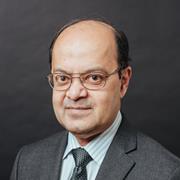Biography
Saroj Biswas is a Professor of Electrical and Computer Engineering at Temple University, Philadelphia, specializing in control and optimization of dynamic systems, multiagent systems, power systems, and distributed parameter systems. Dr. Biswas received his Ph.D. in Electrical Engineering from University of Ottawa, Canada in 1985, and master’s and bachelor’s degrees in Electrical Engineering from Bangladesh University of Engineering and Technology in 1977 and 1975, respectively. His current research focuses on security of cyber-physical systems with applications to the power grid, and the development of an intelligent virtual laboratory for electrical machines. He has also developed a control theoretic framework for analysis and regulation of magnetic signatures. Dr. Biswas is the author or co-author of over 125 research articles in refereed journals or conferences, and has been involved with funded research from various industries and federal sources including NSF and ONR. He is an associate editor of Journal of Industrial and Management Optimization, and former associate editor of Dynamics of Continuous, Discrete and Impulsive Systems, Series B. Dr. Biswas is a Life Senior Member of IEEE, and member of ASEE, and Sigma Xi.
Research Interests
- Optimization and Control
- Magnetic Signatures
- Control System Security
- Multi-Agent Systems
- Power Systems
- Distributed Systems
Courses Taught
|
Number |
Name |
Level |
|---|---|---|
|
ENGR 2011 |
Engineering Analysis and Applications |
Undergraduate |
|
ENGR 2011 |
Engineering Analysis & Applications |
Undergraduate |
|
ENGR 2013 |
Engineering Analysis and Applications Lab |
Undergraduate |
|
ECE 3412 |
Classical Control Systems |
Undergraduate |
|
ECE 3413 |
Classical Control Laboratory |
Undergraduate |
Selected Publications
-
Ziyabari, S., Zhao, Z., Du, L., & Biswas, S.K. (2023). Multi-Branch ResNet-Transformer for Short-Term Spatio-Temporal Solar Irradiance Forecasting. IEEE Transactions on Industry Applications, 59(5), pp. 5293-5303. Institute of Electrical and Electronics Engineers (IEEE). doi: 10.1109/tia.2023.3285202
-
Ahmed, N.U. & Biswas, S. (2023). Optimal strategy for removal of greenhouse gas in the atmosphere to avert global climate crisis. Electronic Research Archive, 31(12), pp. 7452-7472. American Institute of Mathematical Sciences (AIMS). doi: 10.3934/era.2023376
-
Ziyabari, S., Du, L., & Biswas, S. (2022). Multi-Branch ResNet-Transformer Based Deep Hybrid Approach for Short-term Spatio-Temporal Solar Irradiance Forecasting. 2022 IEEE Energy Conversion Congress and Exposition (ECCE), pp. 1-5. 2022 IEEE Energy Conversion Congress and Exposition (ECCE): IEEE. doi: 10.1109/ecce50734.2022.9947670
-
Ziyabari, S., Du, L., & Biswas, S.K. (2022). Short-term Solar Irradiance Forecasting based on Self-Attentive Transformers. 2022 IEEE Power & Energy Society General Meeting (PESGM), pp. 1-5. 2022 IEEE Power & Energy Society General Meeting (PESGM): IEEE. doi: 10.1109/pesgm48719.2022.9916713
-
Ziyabari, S., Du, L., & Biswas, S.K. (2022). Multibranch Attentive Gated ResNet for Short-Term Spatio-Temporal Solar Irradiance Forecasting. IEEE TRANSACTIONS on INDUSTRY APPLICATIONS, 58(1), pp. 28-38. doi: 10.1109/TIA.2021.3130852
-
Ahmed, N.U. & Biswas, S. (2022). Optimal vector measures and relaxed controls for a class of nonlinear systems. Discussiones Mathematicae. Differential Inclusions, Control and Optimization, 42(1), pp. 27-27. University of Zielona Góra, Poland. doi: 10.7151/dmdico.1229
-
Biswas, S.K. & Ahmed, N.U. (2021). Mathematical modeling and optimal intervention of COVID‐19 outbreak. Quantitative Biology, 9(1), pp. 84-92. Wiley. doi: 10.15302/j-qb-020-0229
-
Ziyabari, S., Du, L., & Biswas, S. (2020). Short-term Solar Irradiance Forecasting Based on Multi-Branch Residual Network. ECCE 2020 - IEEE Energy Conversion Congress and Exposition, pp. 2000-2005. doi: 10.1109/ECCE44975.2020.9235930
-
Ziyabari, S., Du, L., & Biswas, S. (2020). A Spatio-temporal Hybrid Deep Learning Architecture for Short-term Solar Irradiance Forecasting. Conference Record of the IEEE Photovoltaic Specialists Conference, 2020-June, pp. 0833-0838. doi: 10.1109/PVSC45281.2020.9300789
